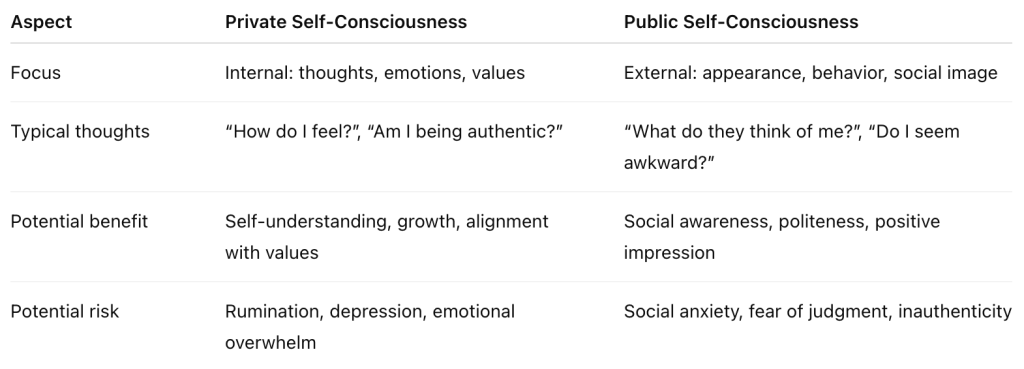Self-consciousness is a part of everyday life. It’s the internal process of noticing ourselves, reflecting on our actions, and thinking about how we come across to others. But not all self-consciousness is the same. Psychologists often divide it into two types: private self-consciousness and public self-consciousness. Understanding the difference between them can help you better understand your own patterns of thinking and how they affect your behavior, confidence, and mental health.
What is private self-consciousness?
Private self-consciousness is the tendency to pay attention to your inner thoughts, emotions, values, and bodily sensations. People high in private self-consciousness often reflect deeply on their personal experiences. They might notice small shifts in their mood, dwell on their reactions, or think a lot about their goals, decisions, or sense of meaning in life.
For example, someone high in private self-consciousness might think:
- “Why did I feel so irritated when my friend said that?”
- “Do my values still match this job I’m in?”
- “I’m not sure if I’m being true to myself.”
This kind of self-awareness can help people grow, make thoughtful choices, and connect more deeply to their sense of identity. But when it goes too far, it can lead to overthinking, rumination, and even emotional distress—especially if someone becomes stuck in self-analysis without resolution.
What is public self-consciousness?
Public self-consciousness, on the other hand, is the tendency to focus on how you appear to others. It involves being aware of how your behavior, appearance, or social performance might be judged. People high in public self-consciousness often monitor their actions in social settings and worry about the impression they make.
For example, they might think:
- “Do I look okay?”
- “Did I say something weird?”
- “Are they judging me right now?”
This awareness can be helpful in some situations, like job interviews, public speaking, or meeting new people, because it encourages people to present themselves well. But if it becomes excessive, it can lead to social anxiety, self-doubt, and withdrawal.
Key differences
While both types of self-consciousness involve self-awareness, they focus on different aspects of the self:

Are they related?
Someone can be high in both types of self-consciousness, just one, or neither. For instance, a person might be very attuned to their internal world (high private self-consciousness) but not worry much about how others see them (low public self-consciousness). Another person might be constantly concerned with social image but rarely reflect on their own values or emotions.
While the two traits are different, they can overlap in some situations. For example, someone might become more self-critical (private) after feeling embarrassed in public (public), and vice versa.
Finding a balance
Both private and public self-consciousness are normal and serve important functions. Problems arise only when either becomes excessive. A healthy balance means:
Using private self-consciousness for personal insight without spiraling into self-doubt.
Using public self-consciousness to guide respectful behavior without constantly fearing judgment.
Mindfulness, self-compassion, and therapy can help people regulate both types of self-awareness. They teach you to notice your thoughts without being overwhelmed by them—and to interact with others without constantly second-guessing yourself.
Conclusion
Self-consciousness is part of being human. Whether it shows up as quiet reflection or social concern, it shapes how we experience ourselves and relate to the world. By understanding the difference between private and public self-consciousness, you can begin to recognize when your awareness is helpful—and when it’s holding you back. That awareness is the first step toward living with more authenticity and confidence.
Frequently Asked Questions
How self-consciousness is related to self-awareness?
Self-consciousness is a form of self-awareness, but it focuses more specifically on how we monitor and evaluate ourselves. While self-awareness is the broader ability to recognize and understand our own thoughts, feelings, and actions, self-consciousness describes how intensely and how often we direct that awareness inward (private) or outward in social contexts (public). In other words, self-consciousness is what happens when self-awareness becomes heightened and more frequent—either through self-reflection or concern about how we’re perceived. People who are highly self-conscious tend to be very self-aware, but that awareness can become uncomfortable or intrusive if not balanced. So, while all self-consciousness involves self-awareness, not all self-awareness turns into self-consciousness. The key difference lies in the intensity and focus of that internal observation.
